If you're dealing with exercise anxiety, you'll find comfort in joining fitness groups designed for gentler, judgment-free movement. Supportive options include mindful walking groups that practice breathing techniques in nature, gentle swimming communities with anxiety-friendly time slots, and beginner yoga circles focusing on foundational poses at your own pace. Low-impact dance groups and tai chi classes offer slower, flowing movements in smaller settings, while adaptive exercise communities welcome all abilities with modified workouts. Senior fitness classes provide manageable pacing with an emphasis on proper form and mutual encouragement. Let's explore these soothing fitness havens that could transform your exercise experience.
Understanding Exercise Anxiety
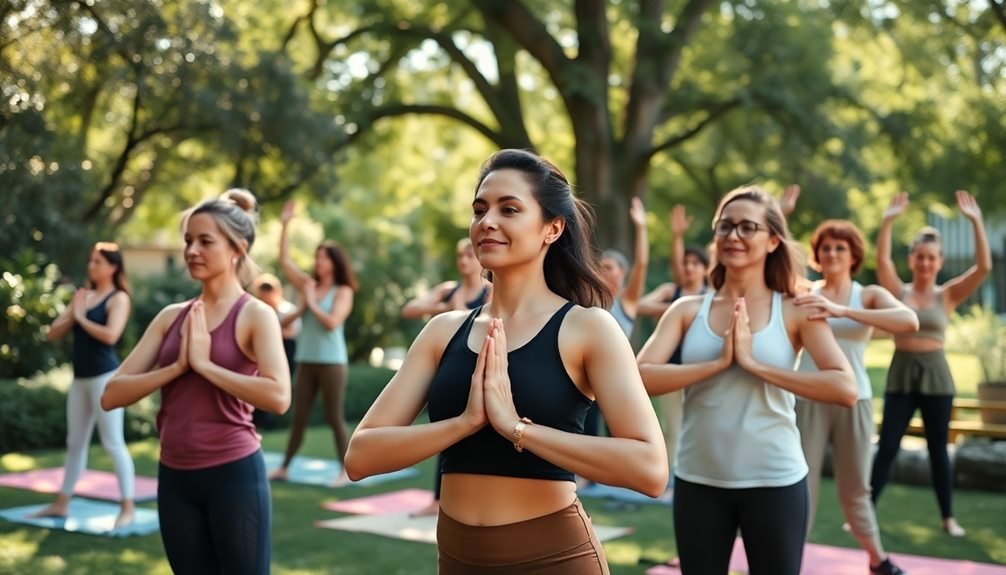
Exercise anxiety crops up when the thought of working out in public triggers intense stress or fear. You'll find yourself worrying about being judged for your form, fitness level, or appearance.
This common experience affects both beginners and experienced exercisers, often leading to avoidance of gyms and fitness classes altogether.
The anxiety typically manifests in physical symptoms like rapid heartbeat, sweating (beyond normal exercise perspiration), and shallow breathing. You might experience racing thoughts about potential embarrassment or feeling out of place.
These feelings can stem from past negative experiences, social anxiety, or body image concerns.
You're not alone if you've felt self-conscious about using unfamiliar equipment or following along in group classes. Many people worry about keeping up with others or standing out as the "newbie."
Understanding that exercise anxiety is a legitimate concern helps you approach it constructively. By recognizing these feelings, you can identify specific triggers and develop coping strategies.
This awareness is your first step toward finding comfortable fitness environments that work for you, rather than letting anxiety dictate your workout choices.
Gentle Swimming Communities
You'll find peace in gentle swimming communities where supportive pool workout buddies guide you through basic water exercises at your own pace.
Water's natural buoyancy helps you move with less pressure while connecting with others who share similar fitness anxieties.
Your journey can include floating meditation sessions, where you'll learn to trust the water and your body while practicing mindfulness techniques in a judgment-free environment.
Supportive Pool Workout Buddies
Many anxious swimmers find solace in gentle aquatic fitness communities, where like-minded individuals gather to support each other's wellness journey.
You'll discover these thoughtful workout buddies understand the challenges of swimming with anxiety, offering encouragement without pressure. They'll respect your pace and comfort level while sharing tips on breathing techniques and relaxation methods in the water.
When you join a pool buddy program, you'll be matched with someone who shares your fitness goals and anxiety management needs.
Your workout partner can help spot your form, celebrate your progress, and provide gentle accountability. Together, you'll create a consistent schedule that works for both of you, making it easier to stick to your swimming routine.
You don't need to worry about judgment or competition – these partnerships focus on mutual support and understanding.
Many pools offer specific time slots for anxiety-friendly swimming pairs, featuring dimmed lighting and quieter environments.
You'll also benefit from sharing coping strategies, whether it's counting strokes together or practicing mindful swimming techniques.
The key is finding someone who understands that mental wellness is just as important as physical fitness.
Floating Meditation Sessions
Water becomes a sanctuary during floating meditation sessions, where gentle swimming communities gather to practice mindfulness in the pool. You'll find these specialized groups meeting in heated indoor pools, focusing on slow, deliberate movements while staying afloat. The combination of water's natural buoyancy and guided breathing exercises helps release physical tension and mental stress.
During a typical session, you'll learn to use flotation devices like noodles or specialized meditation rafts while an instructor guides you through visualization techniques. The water temperature stays at 92-95 degrees Fahrenheit, creating ideal conditions for muscle relaxation.
You'll practice various floating positions, from back floating to vertical meditation stances, all designed to promote a sense of weightlessness. These groups often incorporate elements of aqua yoga and tai chi, helping you develop body awareness while staying gently suspended.
You don't need to be a strong swimmer to participate – most sessions take place in shallow areas where you can touch the bottom. The emphasis remains on creating a judgment-free environment where you can explore meditation at your own pace, supported by both the water and your fellow participants.
Mindful Walking Groups
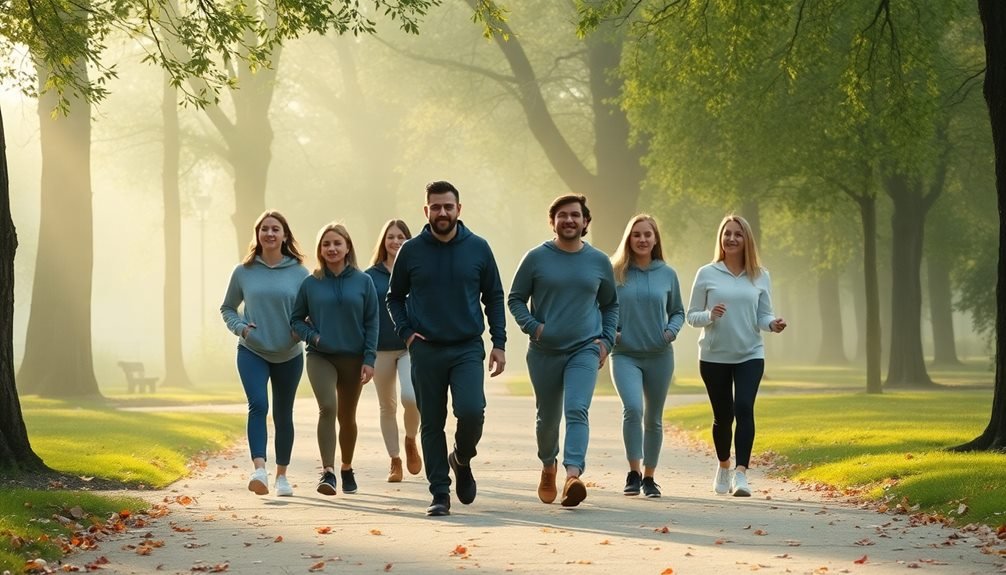
Mindful walking groups can transform your daily stroll into a powerful tool for managing anxiety and stress while building meaningful connections with others.
You'll find these groups typically meet in parks, nature trails, or quiet neighborhoods where you can practice breathing exercises and grounding techniques as you walk.
To locate a mindful walking group in your area, check community bulletin boards, local wellness centers, or search social media platforms where many groups regularly post their meeting schedules.
Benefits for Mental Health
While traditional exercise routines can feel overwhelming, mindful walking groups offer powerful mental health benefits for those battling anxiety and stress.
You'll discover that walking mindfully in a group setting helps reduce symptoms of depression and anxiety by releasing endorphins while maintaining a manageable pace that won't trigger panic.
The social aspect of these groups provides built-in support and accountability without the pressure of intense social interaction. You're free to engage in conversation or walk in comfortable silence, knowing you're part of a supportive community that understands your challenges.
Studies show that combining mindfulness with gentle movement can lower cortisol levels and improve sleep quality.
You'll also develop practical coping skills as you learn to stay present and grounded through breathing techniques and mindful observation.
The structured yet gentle nature of these walks helps you build confidence gradually, while the outdoor setting exposes you to mood-boosting natural light and vitamin D.
Regular participation can improve your emotional regulation, reduce rumination, and strengthen your ability to handle daily stressors – all within a judgment-free environment that respects your personal boundaries.
Finding Local Walking Groups
These days, locating mindful walking groups has become easier thanks to digital resources and community wellness initiatives.
You'll find that many local organizations now host regular walking meetups designed specifically for people managing anxiety or seeking a gentler approach to fitness.
Start your search by checking popular platforms like Meetup.com, Facebook Groups, or NextDoor, where you can filter for walking groups in your area.
Local community centers, wellness clinics, and mental health organizations often maintain directories of established walking groups that prioritize mindfulness and emotional support.
- Mental health walking groups that combine gentle exercise with informal peer support
- Nature walking circles that focus on forest bathing and mindful observation
- Neighborhood stroll groups that welcome anxious beginners and maintain a calm pace
- Meditation walking clubs that incorporate breathing exercises and walking meditation
If you can't find an existing group that fits your needs, consider partnering with a local mental health professional or wellness coach to start your own.
Many recreation centers and parks departments will help promote new walking groups through their channels, making it easier to connect with like-minded participants.
Beginner Yoga Circles
For those who feel intimidated by traditional yoga studios, beginner yoga circles offer a gentle introduction to the practice in a supportive group setting.
These intimate groups typically consist of 5-10 participants who meet in community centers, parks, or members' homes, creating a less overwhelming environment than large commercial studios.
You'll find that most beginner circles focus on basic poses and breathing techniques, with instructors who understand anxiety and emphasize modifications.
Many groups incorporate "sharing circles" before or after practice, where you can voice concerns or celebrate small victories with others who share similar challenges.
To find a beginner yoga circle, check platforms like Meetup.com or Facebook Groups, or inquire at local mental health organizations.
Many circles offer flexible "drop-in" options, so you won't feel pressured to commit long-term.
Look for groups that specifically mention terms like "anxiety-friendly," "gentle yoga," or "mindful movement."
When choosing a circle, you're encouraged to observe a session first.
Pay attention to the instructor's teaching style and the group's dynamic to guarantee it matches your comfort level and goals.
Nature Hiking Meetups
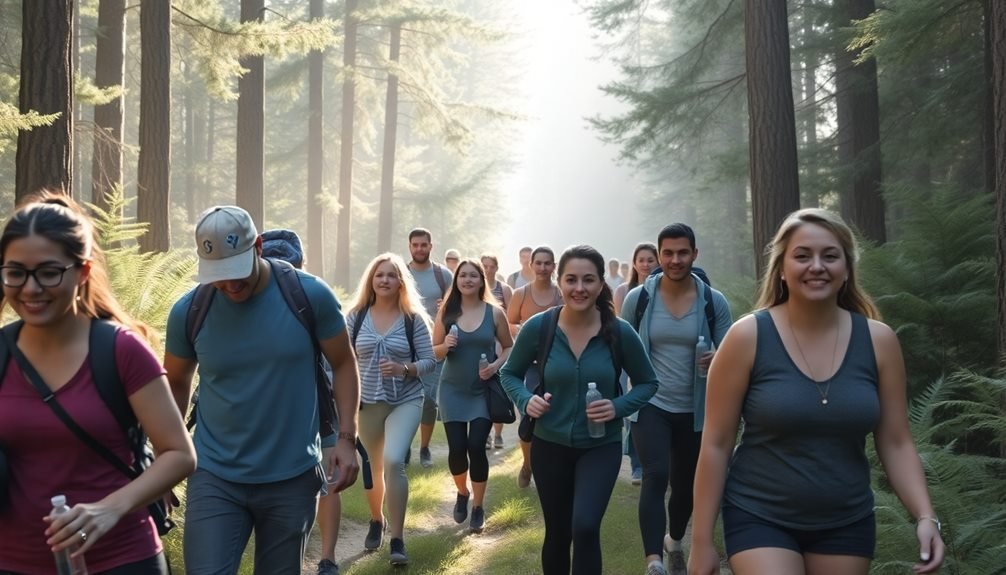
Moving from the indoor calm of yoga to outdoor serenity, nature hiking meetups provide another anxiety-friendly fitness option. These groups typically focus on slower-paced walks through natural settings, allowing you to exercise while connecting with both nature and fellow hikers who understand social anxiety.
Most nature hiking meetups cater to beginners and emphasize a judgment-free environment. You'll find organizers who carefully select trails that won't overwhelm newcomers, and they'll often break larger groups into smaller pods of 4-6 people to prevent social overload.
Picture yourself in these calming settings:
- Quiet forest trails with filtered sunlight and the soft crunch of leaves underfoot
- Peaceful lakeside paths where you can pause to watch rippling water
- Early morning meadow walks with dewdrops glistening on wildflowers
- Gentle woodland routes with natural rest spots for mindful breaks
You'll benefit from the combination of light cardio, stress-reducing exposure to nature, and controlled social interaction. Many groups also incorporate mindful walking practices, encouraging you to focus on your surroundings rather than anxious thoughts.
Senior Fitness Classes
Gentle rhythms and welcoming faces characterize senior fitness classes, which offer an ideal environment for those battling anxiety. You'll find that these groups typically move at a manageable pace, allowing you to focus on proper form while building confidence in a supportive atmosphere.
Most instructors understand age-related limitations and anxiety concerns, adapting exercises to accommodate various fitness levels.
You can choose from water aerobics, chair yoga, or low-impact strength training sessions, all designed to minimize joint stress while maximizing social connection. Many participants report that the predictable routines and familiar faces help reduce their anxiety levels over time.
You'll notice that competition isn't emphasized; instead, there's a focus on personal progress and mutual encouragement.
Most senior fitness classes meet during off-peak hours when gyms are quieter, and you won't feel overwhelmed by crowds or loud music.
You'll also benefit from modified exercises that improve balance, flexibility, and core strength – essential elements for maintaining independence and reducing fall risks.
Many programs offer trial classes, so you can observe the atmosphere before committing to regular attendance.
Adaptive Exercise Communities
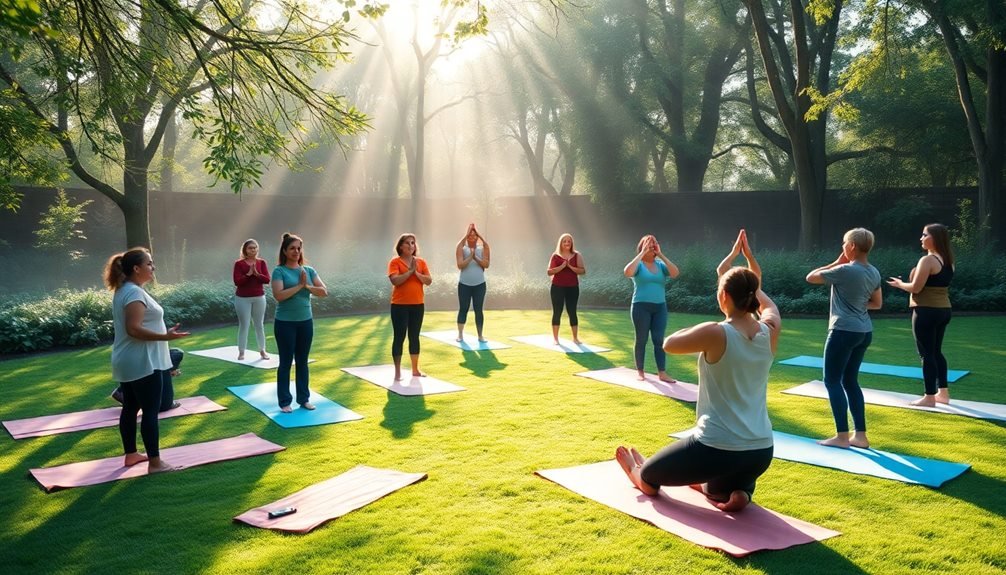
Specialized adaptive exercise communities create safe spaces for individuals with physical limitations or disabilities to engage in fitness activities.
You'll find these communities offer modified workouts and supportive environments where members can exercise at their own pace without judgment. Programs typically feature certified instructors who understand various physical conditions and can adapt exercises accordingly.
These communities focus on accessibility and inclusion, guaranteeing you'll have access to proper equipment and modifications that match your specific needs.
You'll discover that many adaptive exercise groups meet both in person and virtually, allowing you to choose the format that works best for you.
- Wheelchair-friendly fitness classes with specially designed equipment and wider spaces for mobility
- Seated exercise programs incorporating strength training, stretching, and cardiovascular activities
- Low-impact water therapy groups that reduce joint stress while building strength
- Support circles that combine gentle movement with social connection and emotional wellbeing
When you join an adaptive exercise community, you'll receive personalized attention and connect with others who share similar challenges.
The instructors will work with your healthcare providers to guarantee your exercise program aligns with your medical needs and goals.
Low-Impact Dance Groups
For those who find traditional exercise intimidating, low-impact dance groups offer a rhythmic alternative that combines artistic expression with mindful movement. You'll discover welcoming spaces where gentle movements flow naturally, without the pressure of complex choreography or high-intensity demands.
These groups typically focus on slower dance styles like tai chi dance, gentle ballet, or modified contemporary movement. You'll learn basic steps at your own pace, with instructors who understand anxiety and emphasize personal comfort over perfection.
Many sessions incorporate breathing exercises and mindfulness techniques, helping you stay grounded while moving. You can find these groups at specialized dance studios, community centers, and wellness facilities that prioritize mental health.
Most classes keep their numbers small, usually 8-12 participants, creating an intimate environment where you won't feel overwhelmed. The music selection often features calming instrumental pieces or nature sounds, maintaining a peaceful atmosphere throughout the session.
Consider starting with a trial class where you can observe the group dynamic and speak with the instructor about any concerns. Many studios offer private introductory sessions to help you build confidence before joining group classes.
Tai Chi for Everyone
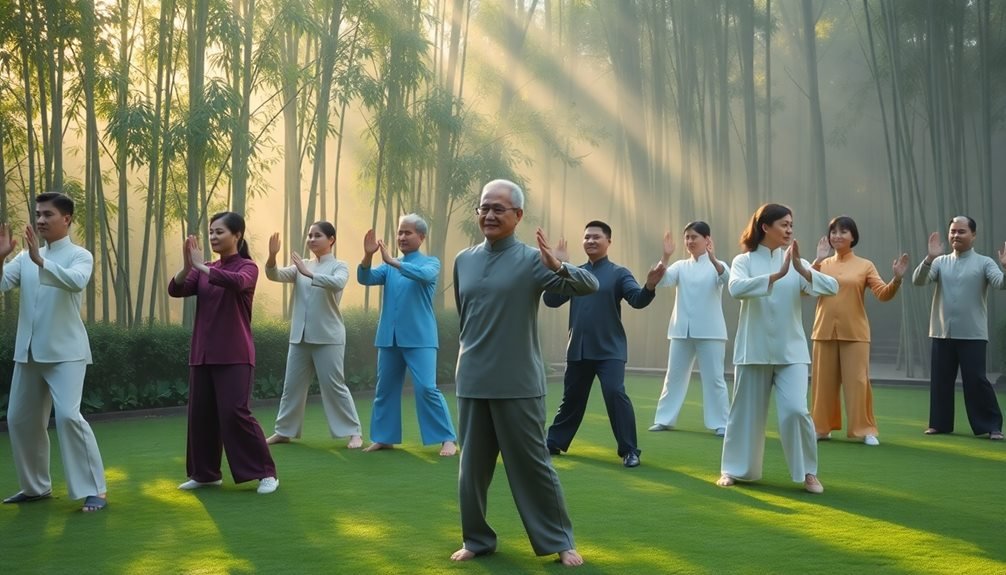
While many exercise forms can feel overwhelming, tai chi stands out as a meditative martial art that welcomes practitioners of all anxiety levels and physical abilities.
You'll find that the slow, flowing movements create a sense of calm while building strength, balance, and flexibility. Most community centers and fitness studios offer beginner-friendly classes where instructors guide you through gentle sequences at a comfortable pace.
What you'll experience in a typical tai chi class:
- Soft, circular movements that feel like moving through water, allowing your muscles to relax while staying engaged
- Breathing exercises synchronized with each pose, helping you stay present and reducing stress hormones
- Simple standing positions that gradually progress to more complex sequences as your confidence grows
- A supportive, non-competitive atmosphere where you can practice at your own speed without judgment
You don't need special equipment or prior experience to start – just comfortable clothes and flat shoes.
Many practitioners find that regular tai chi practice not only improves their physical well-being but also helps manage anxiety through its mindful approach to movement and breath awareness.
Frequently Asked Questions
How Long Should I Wait After Eating Before Joining a Fitness Group?
You'll want to wait 2-3 hours after a large meal or 30-60 minutes after a small snack before exercising. This helps prevent discomfort and gives your body time to properly digest the food.
What Happens if I Need to Leave a Session Early?
If you need to leave early, let your instructor know before class begins. You can quietly exit during natural breaks, but it's best to plan for full sessions to get maximum benefits and avoid disrupting others.
Can I Bring a Support Person to Group Sessions?
You're welcome to bring a support person to your group sessions. Just let your instructor know in advance, and they'll help accommodate you both while maintaining a comfortable environment for everyone in class.
Are There Shower Facilities Available at Most Fitness Group Locations?
You'll typically find showers at most fitness facilities, but it's best to call ahead and check. Some smaller group locations or community centers might not have them, so pack your toiletries accordingly.
Do These Groups Offer Trial Sessions Before Committing to Membership?
You'll find most fitness groups offer trial sessions or free class passes. It's a great way to test the atmosphere and instructors before you commit. Just call ahead to schedule your trial visit.
In Summary
You'll discover that finding your perfect fitness community isn't about pushing yourself to extremes – it's about connecting with others who share your concerns and pace. Whether you're drawn to the calming waters of a gentle swim group or the mindful movements of tai chi, there's a welcoming space waiting for you. Start small, move at your own speed, and you'll build both strength and confidence naturally.

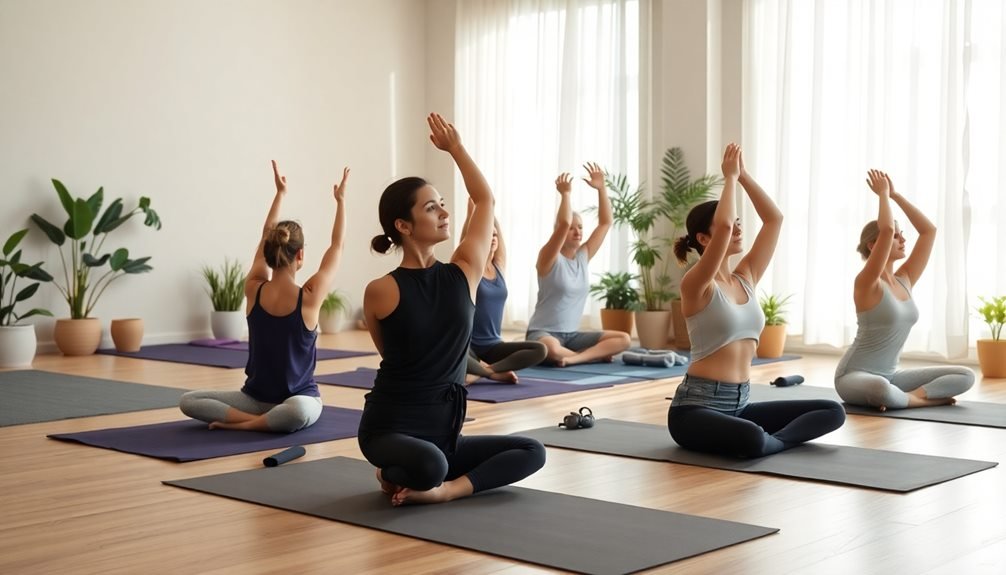



Leave a Reply